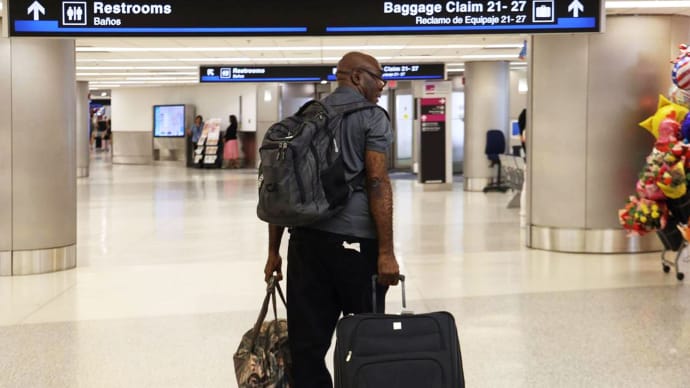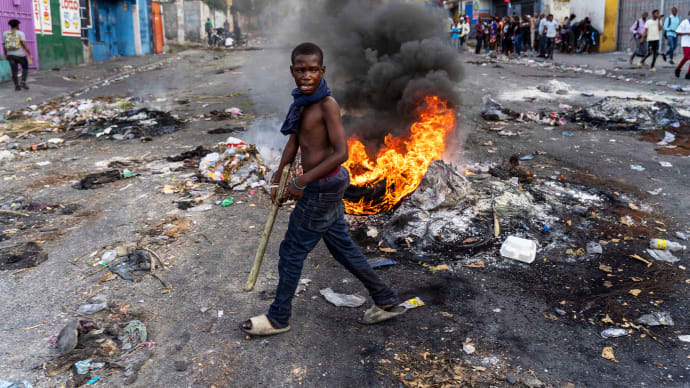Rescue groups are struggling to evacuate American citizens who remain trapped in Haiti, where a deadly eruption of gang violence earlier this month has left the state teetering on the brink of collapse.
The ongoing violence, which has killed at least 1,500 people so far, has made for a a “very, very challenging environment” for rescue operations, according to Paul Doucet, a regional director at International SOS, an emergency medical and security organization involved in the evacuation efforts.
“There’s a lot of nervousness. The city has really devolved into lawlessness,” Doucet said, recounting that rounds of gunshots have been going off nearly every night, leaving people who want to escape on edge and in a “panic.”
Sources working with private security firms and non-profits involved in the Haiti missions told The Daily Beast that facilitating the evacuations—while also avoiding the more embattled areas in Haiti—has proved difficult in recent days.
Armed gangs have seized the capital, Port-au-Prince, and targeted civilians in widespread kidnappings and attacks. Gangs are blocking roads and ports, and the shuttered airport in the capital has made fleeing particularly dangerous.

The first evacuation flight out of Cap-Haitien, Haiti, landed at Miami International Airport earlier this month. Francius St. Alma of Miami was among the passengers.
Carl Juste / Miami Herald / Getty
The U.S. government, for its part, has evacuated approximately 450 Americans from Haiti since March 17, organizing a charter flight and helicopter evacuations. Just on Thursday, another helicopter evacuation brought Americans from Port-au-Prince to Santo Domingo, the capital of the Dominican Republic, which shares the island of Hispaniola with Haiti.
In total, the United States estimates that approximately 1600 Americans that have reached out for assistance, an estimate U.S. officials shared last week.
Over 300 gangs and some 700 gangsters have been instigating violence since the early days of the crisis in Haiti, according to the Pentagon’s U.S. Southern Command. The government declared a state of emergency on March 4; Haitian Prime Minister Ariel Henry stepped down a week later. The situation has continued to deteriorate for millions in Haiti ever since. Although an international coalition is urging Haitians to band together and chart a new path forward for the country, there is no end in sight to the violence.
A powerful Haitian gang leader, Jimmy Cherizier, who is known as “Barbecue,” told Sky News in an interview released Friday that he would, in theory, consider a ceasefire—but indicated now is not the time.
“At the moment we haven’t got to the point where we should put down our weapons,” he said. “In the days that are coming, things will get worse than they are now.”
The effort to safely evacuate Americans is, in this case, all hands on deck. The flurry of private or nonprofit entities involved come alongside diplomatic efforts to rescue U.S. citizens, as well as efforts from individual U.S. lawmakers and governors. Representatives Lisa McClain (R-MI) and Cory Mills (R-FL) helped evacuate 10 Americans earlier this month. Florida Gov. Ron DeSantis has also arranged a charter flight for evacuees.
McClain has accused Biden of “abandoning” Americans in Haiti when his administration pulled out non-essential personnel at the U.S. mission in Haiti, but did not evacuate other Americans.
Some countries have been less capable than others of helping their citizens through the crisis, which has come as somewhat of a shock, Doucet said.
“I’ve done a lot of these over the years,” Doucet said, adding that “there’s obviously varying degrees of success from different countries in actually executing evacuations. There’s some countries in this particular case I was genuinely surprised—I won’t name names—but I was genuinely, genuinely surprised at certain countries’ inability to support.”
Bryan Stern, Founder and CEO of Project Dynamo, which has also been evacuating people from Haiti, said his main goal is to do what he can to help.
“If they can’t, if they won’t? We’re happy to do it,” Stern said of the governments’ willingness to conduct evacuations, adding that his main goal is to conduct safe and legal evacuations, not fight about them with government entities.

A mans walks past a burning barricade during a protest against Haitian Prime Minister Ariel Henry in Port-au-Prince last year.
Richard Pierrin / Getty
Chaos
International SOS, much like the U.S. government, settled on evacuation by helicopter as the safest option after considering all other routes, from ground transport to evacuation by sea. But all of the other possibilities were just too dangerous, given the current risk of roadblocks, and threats of kidnapping, assault, and carjacking.
“All of those options were completely stymied by the level of violence on the ground,” Doucet said, adding the gangsters have “made it impossible to even entertain the notion of undertaking road movement and exposing our clients to that level of risk.”
While some maritime risk management companies that International SOS works with were able to approach some ports in Haiti early on, the situation deteriorated so much that they eventually got shot at upon approach, leaving that option untenable, said Doucet.
The nervousness among those seeking to flee is “palpable,” he added.
“We had a day or two where we were still working through all the permitting, and they were hopeful one day we’d be able to fly, and ultimately we weren’t able to and had to push it to the next day. That caused quite a bit of consternation,” he said.
“People have just had to accept there was another night now in this city where a lot of things are possible, a lot of bad things could happen quite realistically.”
The permitting process has significantly hampered Project Dynamo’s plans for evacuating Americans as well.
“The biggest problem is getting landing clearance and takeoff clearance,” Stern said, sharing that the Dominican Republic has refused to provide Project Dynamo the proper approvals to evacuate Americans through the country.
Passengers walk through the Arrivals area after arriving in Miami on the first evacuation flight out of Cap-Haitien, Haiti, earlier this month.
Carl Juste / Miami Herald / Getty
“The people that we took out two days ago [from Haiti]—I’d been trying to get takeoff clearance for two weeks,” Stern said, adding that they eventually worked with Turks and Caicos for evacuation routes.
Although the helicopters have successfully carried Americans to safety, even those evacuation routes feel precarious at times. Project Dynamo’s teams have been under fire on at least three different occasions during evacuations, Stern told The Daily Beast.
“It was probably designed to scare us more than anything else,” Stern said, stressing that getting Americans out safely is his only goal. “I’m not there to get in a gunfight.”

